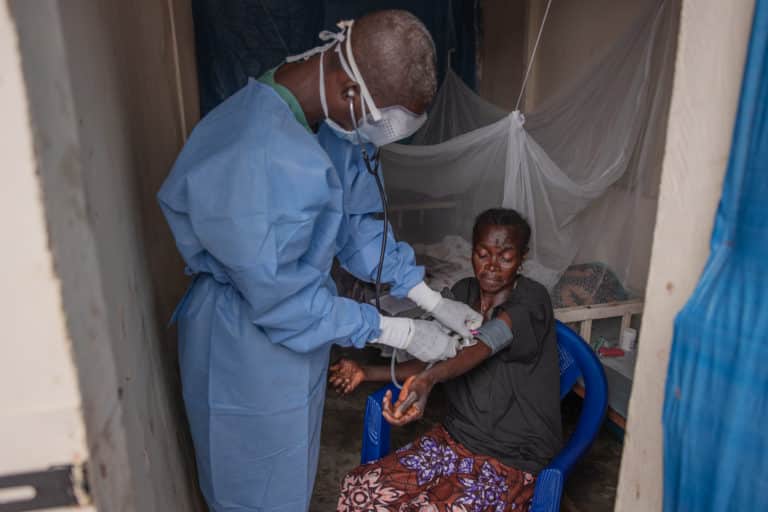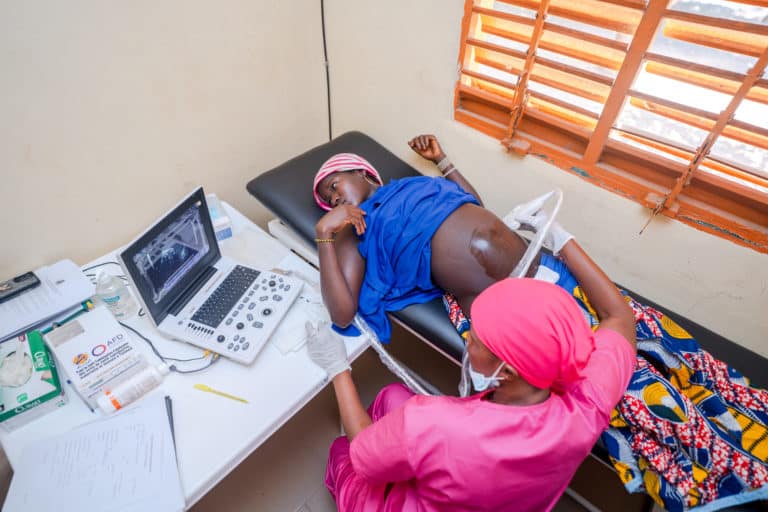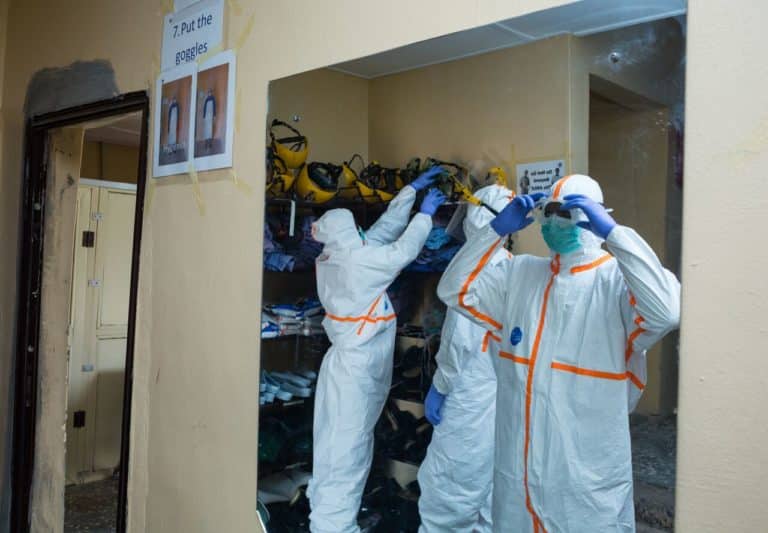ERNEST
Ernest, who is from Cameroon, had been on a mission in Guinea for an international organization, and was about to travel to Australia for another mission. But he would have to postpone his trip.
Ernest, like all travelers nowadays, went for a COVID-19 test, in anticipation of his upcoming travels. He says he was not worried, as he felt healthy. So it was quite a surprise was when he learned that he tested positive for the virus.
“I didn’t know I had COVID-19 because I didn’t have a cough, headache or fever,” he explains.
Ernest is an asymptomatic patient, meaning he is infected with the virus and can spread it to others, but does not feel sick. From the time he was admitted to the COVID-19 treatment center until his discharge a few days later, he presented no symptoms.
Despite his surprise diagnosis, he says that overall his experience during the hospital stay was good: “The care is excellent. All the staff who work here are really nice. The relationship between the staff and patients is very good.”
A psychologist by profession, Ernest was able to use his skills to provide additional emotional support to the patients who shared his room. “The young man in the bed next to me was a little demoralized when he arrived,” he recalls. “I took the time to explain to him that this isn’t the end of life and that it’s going to be okay.”
ALIMA’s medical team also provides psychological support to patients by listening to them, explaining the disease and reassuring them.
An ALIMA health worker takes Daouda’s temperature, sitting on his bed at the COVID-19 treatment center in Donka Hospital, Conakry, Guinea. August 2020. © Sydproduction / ALIMA
DAOUDA
Daouda works at a bank in Guinea. At his office one day, he and his colleagues were all tested for COVID-19 as part of a screening campaign. Daouda’s first test: negative. But then he coughed. A normal cough, one he has from time to time throughout the year. But during this pandemic, there is no room for uncertainty; he is tested a second time. This time, his test comes back positive.
Health workers asked him to come to the COVID-19 treatment center in Donka and he agreed. During his hospitalization, his fever spiked a few times, but he remained optimistic and praises the work of the health staff: “Our doctors are tending to us very well and they are really doing everything they can to keep us healthy.”
Seven days after his admission, the test showed that he was still carrying the virus, and when we met him, he was waiting for the results of a new test. If he tests negative, he can be discharged from the treatment center.
Daouda is confident that his condition has greatly improved. “The first thing I’m going to do when I get out is to thank God for allowing me to heal and to thank the doctors who cared for me,” Daouda says smiling. He adds: “It is a disease that can be overcome. I advise everyone to wear a mask.”
MR. AND MRS. TOURE
Mr. and Mrs. Touré share a room in the intensive care unit of the COVID-19 treatment center in Donka. It was likely at work that one of them was initially infected.
A dental surgeon, Mrs. Touré suspended her activities at the beginning of the COVID-19 crisis to avoid any risk of contamination. But her husband, an anesthesiologist and intensive care specialist, continued to practice. “I was seeing patients in my clinic who were having difficulty breathing and needed oxygen. Some of them tested positive for COVID-19,” he explains.
It was the decrease in her husband’s oxygen saturation level that first alerted the Tourés. Knowing that he was particularly exposed in his work, Mr. Touré regularly measured his oxygen level with his pulse oximeter. When it dropped, he quickly took a COVID-19 test, which came back positive.
Suffering from diabetes and hypertension, Mr. Touré is among those considered particularly vulnerable to COVID-19. Tired and having difficulty breathing, he was placed in the intensive care unit to receive oxygen. After several days of oxygen therapy, his condition improved. “I’m glad I was told about oxygen therapy,” he says. “My oxygen saturation is now improving, even during physical exertion.”
For Mrs. Touré, her symptoms presented differently: coughing, loss of taste and smell, and mild respiratory problems, especially after her daily walk. She had been on an oxygen concentrator for five days at the time we met her and was on the road to recovery.
THIERNO
Thierno* lives in the United States, but had come back to Guinea to visit his family. Suddenly, in the space of 15 days, he lost both his parents.
His mother died in the car that was taking her to the hospital after she collapsed at home. According to the tests performed before the funeral, she was a carrier of the COVID-19 virus. The whole family was then tested: Thierno, his child, his father and his aunt were also positive.
Thierno’s father, aged 77, was the one whose condition was the most worrisome, particularly because of the psychological shock linked to the loss of his wife. He was in intensive care for several days, but his condition worsened and six days later, he too died.
Thierno is doing relatively well. Physically at least. Psychologically, on the other hand, he is deeply marked by the tragedy he has just experienced. So he wants to warn Guineans: “This is a serious matter. People tend to minimize the disease. But it is a disease that is extremely dangerous, and I urge the entire population to respect the protection measures.”
————————————————————-
*Name has been changed to protect the patient’s identity.
Since April 6, 2020, ALIMA has been supporting the National Health Security Agency of Guinea in the care of patients with COVID-19 at the Donka COVID-19 treatment center in Conakry.
ALIMA’s activities at the COVID-19 treatment center in Donka are financed by the European Union.
The contents of this publication are the sole responsibility of ALIMA and do not necessarily reflect the views of the European Union.
Cover photo: © Sydproduction / ALIMA



